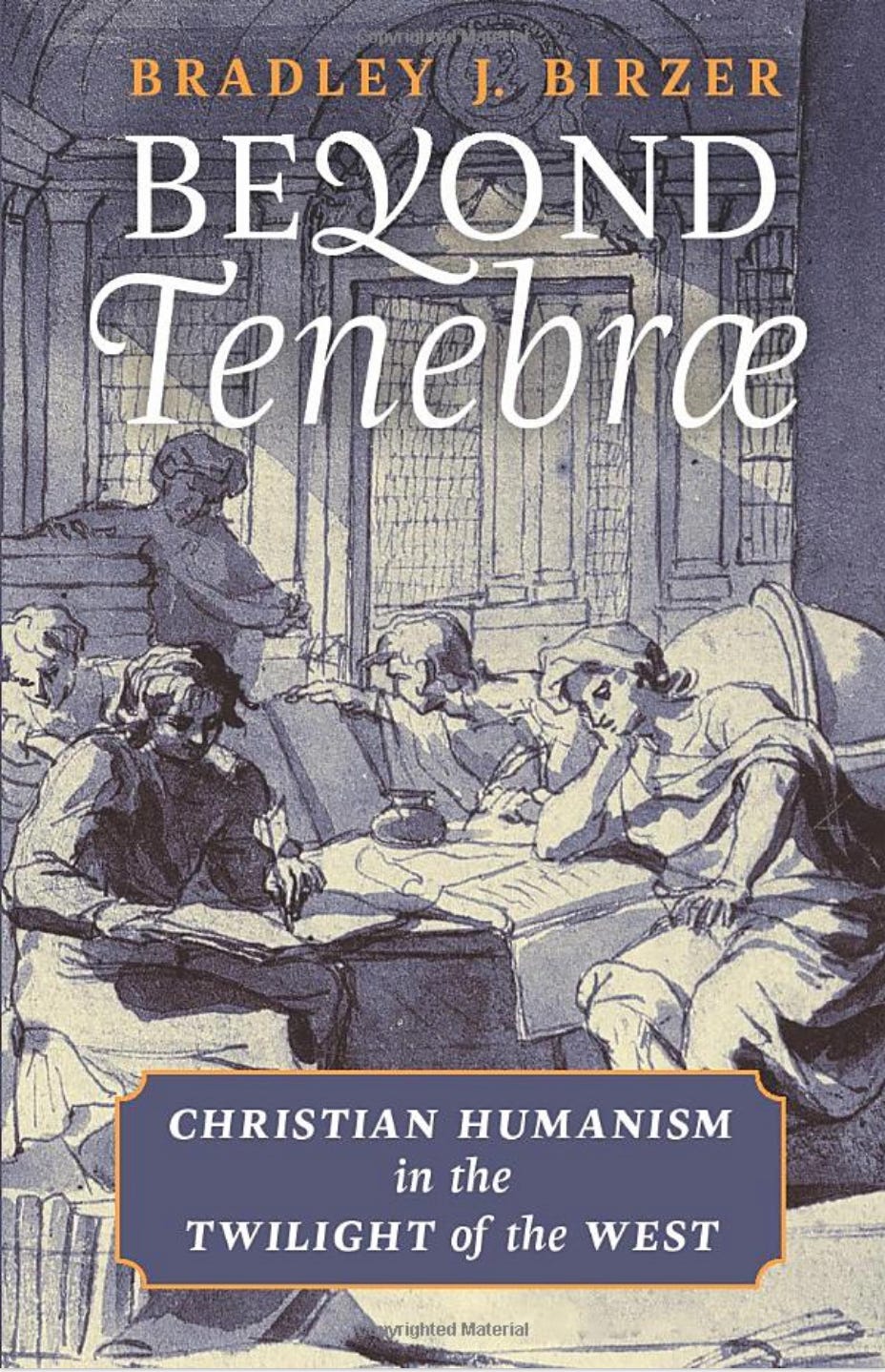|
 |
A Weekly Report From The Vast Swinging Bridge
Last week’s newsletter was rather long so I’ll make up for it by keeping this week’s newsletter fairly short.
Someone on social media recently mentioned that I wear the Christian humanist badge proudly (my best recollection of the statement). I appreciated the comment for one particular reason: I want more people to think and talk about Christian humanism since it is too often misunderstood. The modern imagination seems incapable of reconciling any meaning inferred by the two words, Christian and humanist. In modern parlance, they are mutually exclusive. But in reality, they are not.
In his book, Beyond Tenebrae, Dr. Bradley Birzer offers five canons of humanism that are helpful for identifying the vision for humanity and the motivations for writing, possessed of Christian humanists. Birzer explains,
First, humanists believe in the dignity of the human person…Second, humanists see liberal education as the most proper education for the development and nurturing of a human being…Third…real humanism never places the human person as the highest of all things, but as in the middle of all things…Fourth, the humanist upholds citizenship in the Republic of Letters—across time—as higher than loyalty to any nation or worldly power…Fifth…the humanist understands that someTHING stands above any one person or all of humanity together.
Further guiding this discussion about humanism, Birzer notes in his work on Tolkien’s Sanctifying Myth, that,
The Christian Humanist asks two fundamental questions: (1) what is the role of the human person within God’s creation? And (2) how does man order himself within God’s creation? Christian, or theocentric, humanism… argues that one cannot understand man’s position in the world until one first acknowledges that man is created in the image of God and lives under the natural law as well as the divine law.
It is the Incarnation that provides the foundation for Christian humanism. Michael Spenser explains, “Christ has joined us in our humanity, and shown us both ourselves and the God at the heart of reality at the same time. The Incarnation demands a consideration of the human person in every aspect of human existence.” This means that because of the Incarnation, “human beings themselves are a clue to God’s existence,” and “There is great dignity and worth in the human person. Human nature can provide for us a point of contact from which to reason about God’s nature and existence.”
Christian humanism is a philosophy of life that faithfully addresses both the human dignity and the reality of revelation by acknowledging, apprehending, and appreciating the complementary nature of Scripture and nature. In an essay titled, “In Defense of Christian Humanism,” Robert Thune argues that
It is the Christian Worldview, rooted in the Incarnation and the Imago Dei, which allows us to speak meaningfully of what it means to be human. The great Christian artists and writers and thinkers of the Christian humanist tradition did not seek to avoid the influences of worldly culture. Instead, they gained a voice in the culture by making meaningful contributions to its art and poetry and literature. Human culture became for them a vehicle for speaking of God. We must recover the genius of their perspective.
I wholeheartedly agree. We moderns (those of us born in the modern period and nurtured and reared on the proverbial food and water of modernity) would do well to recover the genius and perspective of Christian humanists like Flannery O’Connor, C. S. Lewis, J. R. R. Tolkien, and so many others who could not help but engage their work in a way that spoke of the transcendent God by addressing the human need.
As a modern man on my own journey of de-modernizing my mind and embracing the Christian humanist imagination, I highly recommend this article by Hans Boersma, All One in Christ: Why Christian Platonism Is Key to the Great Tradition. If you lack the time to indulge this brilliant piece, I think he really gets to the heart of the matter when he writes,
Christian Platonism helps us to read Scripture as Scripture. Those who reject Christian Platonism may think they are simply left with the pure gold of Scripture, but in actual fact, they simply replace one metaphysic with another—an atomistic, modern approach, which separates heavenly from earthly realities. When we rid ourselves of Platonic forms, thinking they are superfluous, the sensible objects of time and place lose their anchor in heavenly realities. (To be sure, Reformation theologies often have a high view of divine providence. But it is a providence that has largely lost its sacramental link with the created order.) As a result, in the secularism of modernity, observable objects are defined by their DNA, and historical events are simply the result of this-worldly cause and effect. Both created objects and historical events are shorn of their transcendent horizon. Sensible objects are form-less, and historical events without providential backdrop.
A Few Commonplaces for Contemplation
The feeling that the work is magnificent, and the feeling that it is abominable, are both mosquitos to be repelled, ignored, or killed, but not indulged. - Annie Dillard, The Writing Life
Man invented cooking before he thought of nutrition. To be sure, food keeps us alive, but that is only its smallest and most temporary work. Its eternal purpose is to furnish out sensibilities against the day when we shall sit down at the heavenly banquet and see how gracious the Lord is. Nourishment is necessary only for a while, what we shall need forever is taste. - Robert Farrar Capon, The Supper of the Lamb.
In the Island in the river He was broken to his knee; And he read, writ with an iron pen, That God had wearied of Wessex men And given their country, field and fen, to the devils of the sea. -G. K. Chesterton, The Ballad of the White Horse
If you liked this post from Rumbling Toward Heaven, why not share it?

